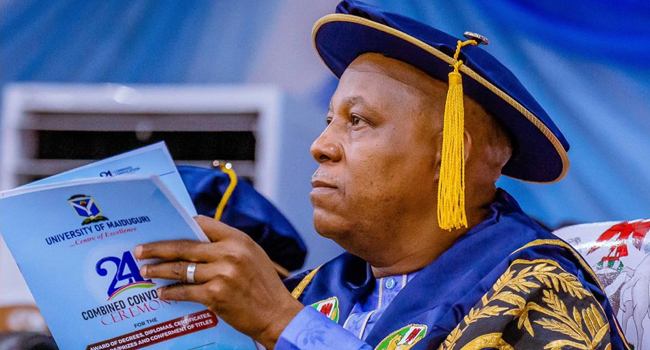Shettima orders car makers to ramp up cng, electric vehicle production
Vice-President Kashim Shettima has demanded that automotive manufacturers ramp up production of Compressed Natural Gas-powered and electric vehicles, warning that Nigeria’s clean-mobility ambition cannot succeed while the country still battles a crippling shortage of CNG refuelling stations.
Speaking at the opening of the 25th Abuja International Motor Fair on Tuesday, Shettima—represented by the Minister of Innovation, Science and Technology, Kingsley Udeh—said the auto industry remained “the engine of the Renewed Hope Agenda”, and crucial to the administration’s plan to drive the nation’s transport future on “Gas, Green and Growth”.
He told industry players that Nigeria’s vast gas reserves presented a rare opportunity to build an affordable mass-transit system, insisting that deepening the use of CNG was central to cushioning the economic strain of ongoing reforms.
Shettima said the theme of the fair, Driving Nigeria’s Automotive Future: Innovation, Sustainability, and Growth, aligned squarely with the administration’s push for Nigerians “to produce what we consume and consume what we produce” while positioning the country as sub-Saharan Africa’s automotive hub.
He declared: “Under the visionary leadership of President Bola Ahmed Tinubu, our administration has embarked on bold, necessary reforms. We are stabilising the economy, opening doors for private enterprise and laying the foundations for long-term growth. The automotive sector is not a side project—it is the engine of our Renewed Hope Agenda.”
Warning that demand for CNG kits, CNG-powered vehicles and electric vehicles was set to surge in the coming years, he challenged manufacturers to show real readiness, saying Nigeria was already signalling its intent through the National Automotive Design & Development Council’s work on electric-vehicle infrastructure.
According to the vice-president, the next phase of Nigeria’s mobility transition must focus on building the skills pipeline, localising battery assembly and securing the country’s place in the global EV supply chain.
Shettima further revealed that the government had released N20bn through Credit Corp to help Nigerians purchase locally assembled cars, stressing that affordable financing was vital to stimulating demand and creating jobs. “When a teacher, a nurse or an entrepreneur can afford a quality, locally assembled car, we fuel a virtuous cycle of demand, production and economic stability,” he said.
But despite the government’s heavy push, Nigeria’s CNG infrastructure remains embarrassingly thin. Most states still rely on pilot stations built under the now-defunct Gas Expansion Programme, while the private sector struggles with financing challenges, high equipment costs and slow regulatory approvals.
Only last month, Farouk Ahmed, Chief Executive of the Nigerian Midstream and Downstream Petroleum Regulatory Authority, warned that Nigeria had fewer than 50 CNG compression stations—a fraction of what is needed for a country of over 200 million people.
He said: “There are less than 3,000 LPG plants in the country and fewer than 50 CNG stations. The gap is huge.”
Experts insist that Nigeria needs hundreds of new CNG stations if the government is serious about transitioning public-transport fleets away from petrol.
Also speaking at the event, Minister of State for Industry, Senator John Enoh, reaffirmed the government’s commitment to strengthening the automotive sector through stable policies and targeted incentives. He said local assemblers had proven they could match global standards.
Earlier, the Director-General of the National Automotive Design and Development Council, Joseph Osanipin, said the agency was pushing ahead with the full implementation of the National Automotive Industry Development Plan. He noted that Nigeria currently has about 30 active assembly plants with close to $1bn in investments, describing it as evidence of strong long-term potential.
Co-organiser of the fair and Managing Director of BKG Exhibition Limited, Ifeanyichukwu Agwu, warned that Nigeria urgently needed a functional national vehicle-financing scheme. “If our people cannot access mobility, our economy cannot move. Vehicle financing is not a luxury; it is a necessity,” he said.
Now in its 25th year, the Abuja Motor Fair remains a key platform for showcasing new-energy vehicles, local automotive innovation and the country’s tentative push towards cleaner mobility.




